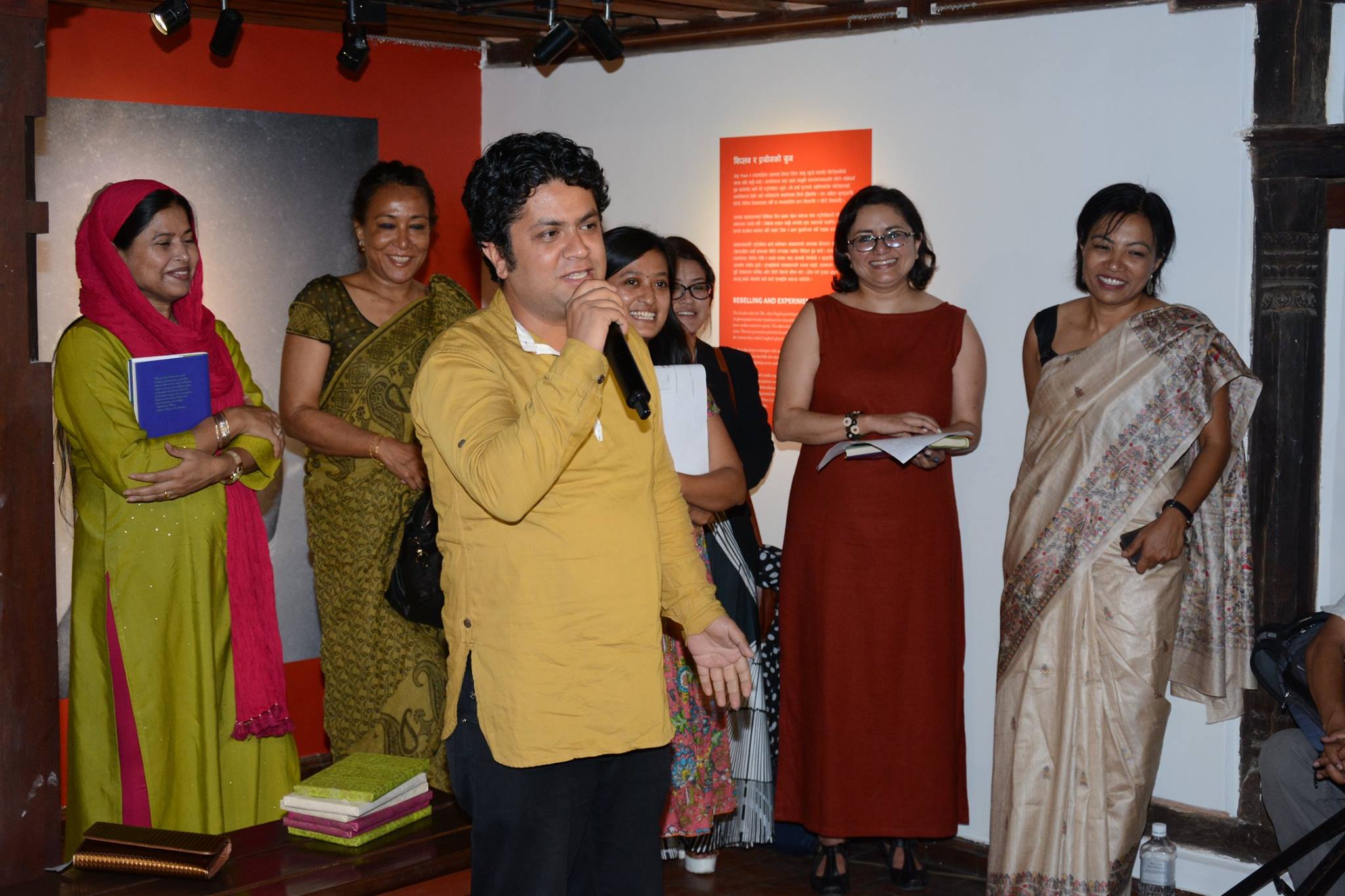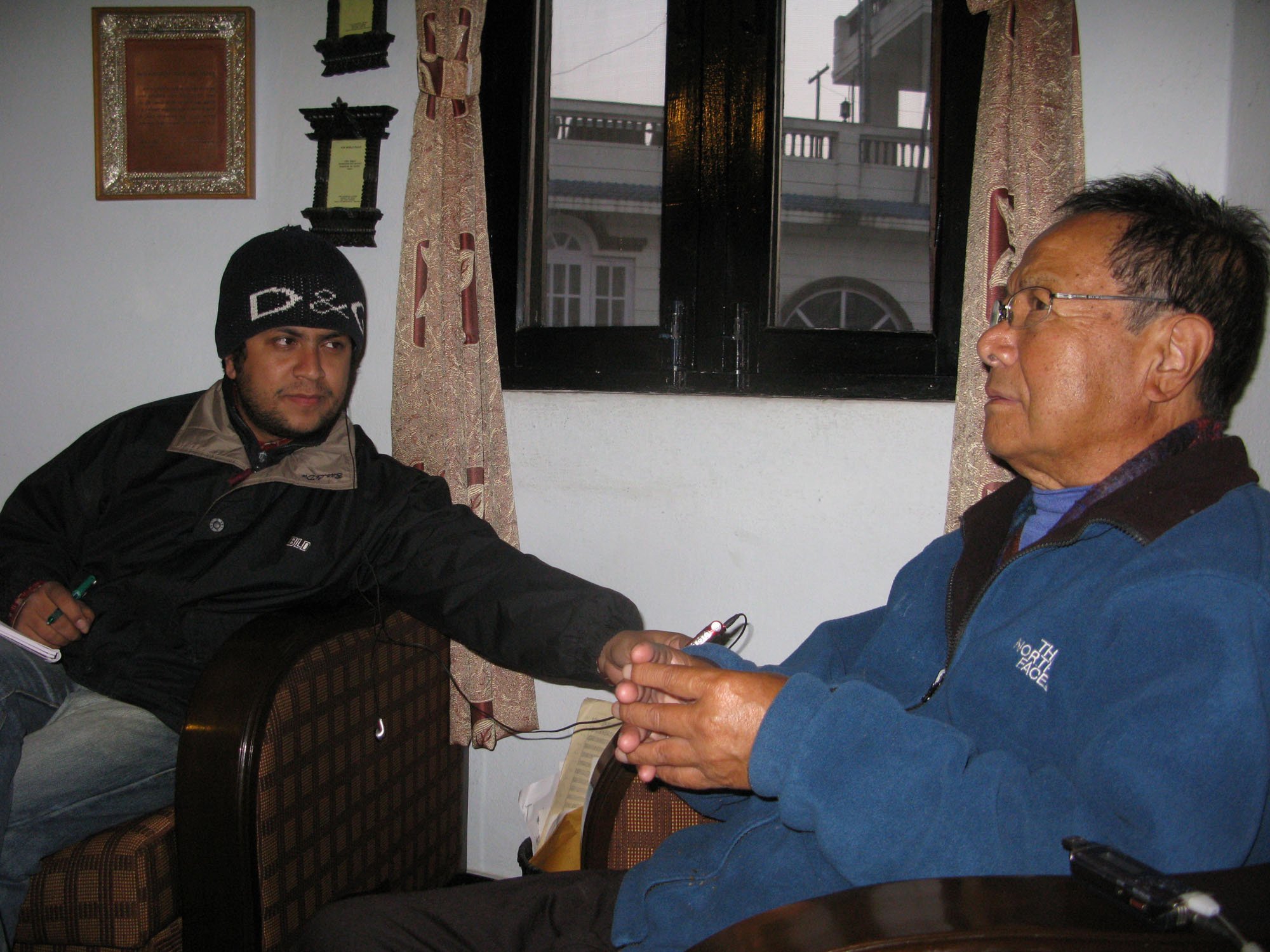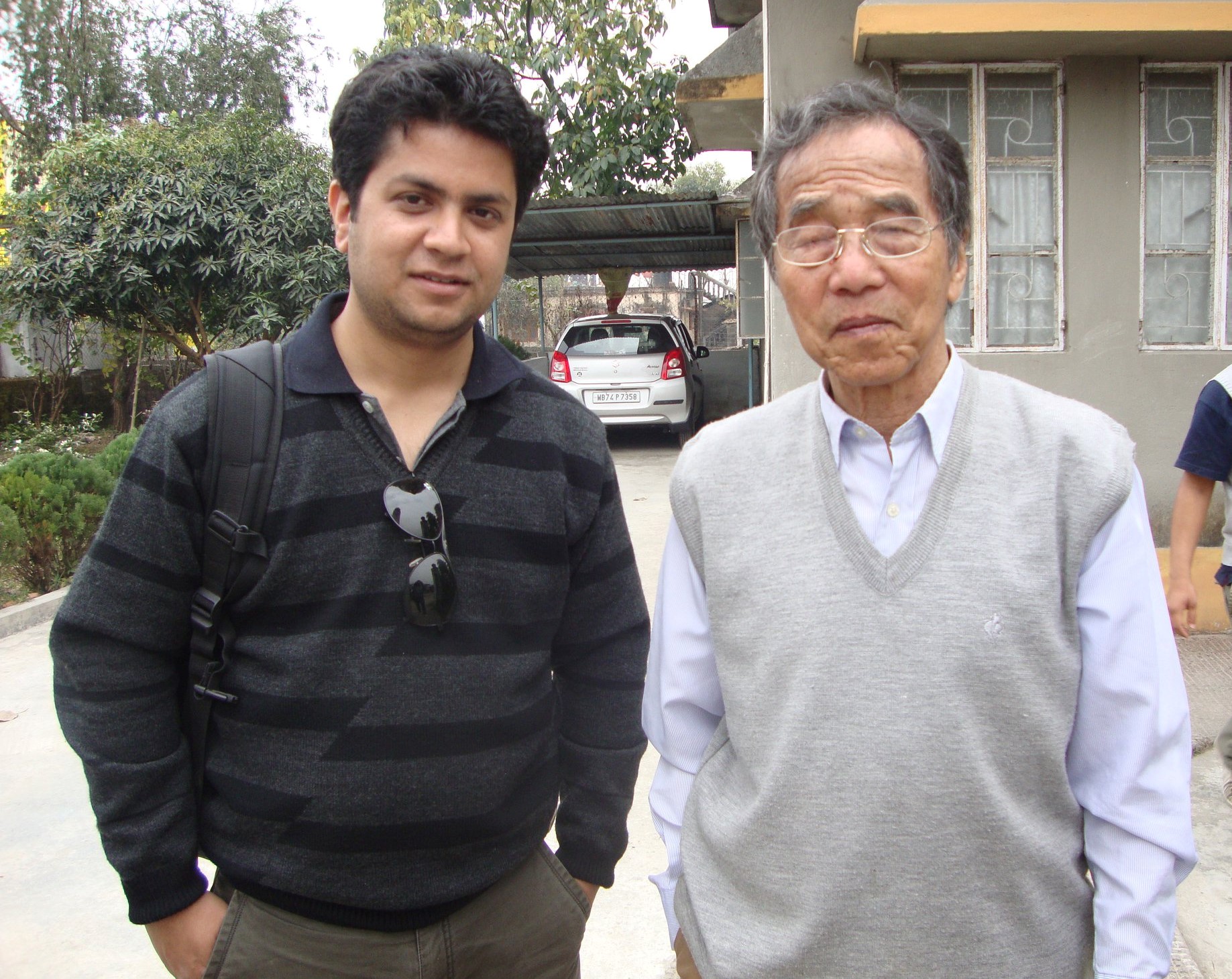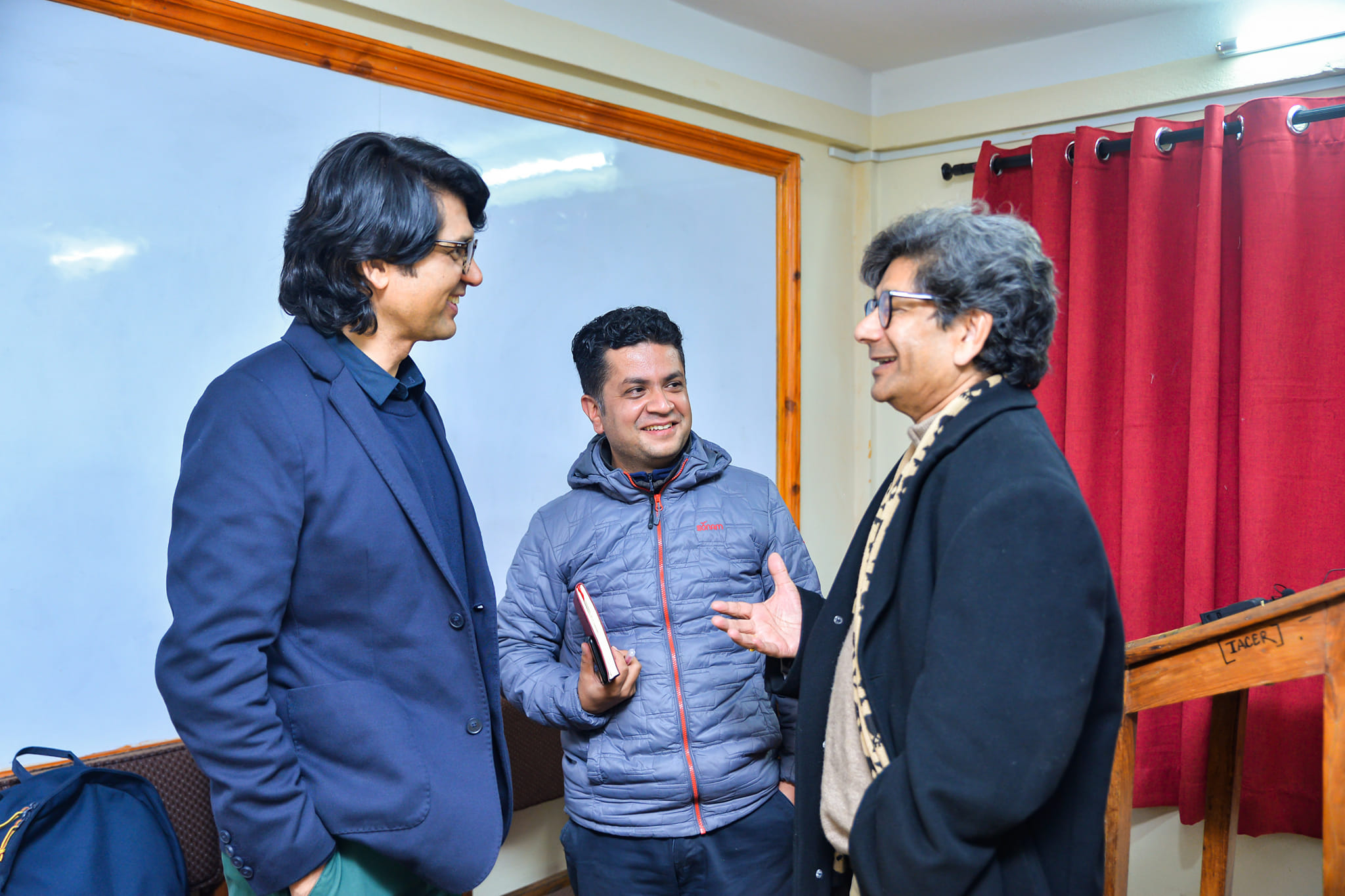
Writing journeys
12 MIN READ

Ujjwal Prasai recounts his time growing up in Kakarbhitta and struggling with writing before coming to Kathmandu and establishing himself as a columnist and writer.

In this week’s Writing Journey, Ujjwal Prasai shares how hard he has worked as well as some of his strategies for improving his writing – from a striving schoolboy to an accomplished professional. It is a story about a young man with drive and perseverance but even more, a story about someone who loves words and stories and writing as a way to explore the world and share with others. Ujjwal ji shares the challenges and pain, but also some of the joys.
In addition to the main thrust of the essay, a few sentences jumped out at me – thoughts that I think deserve lingering on and reflecting upon.
Along his journey as a writer, Ujjwal ji found people who offered important words of encouragement but also a school system that provided little help. “One time I gave a short story in English to a half dozen of my teachers,” he writes. “I received not a word of feedback.” Not a word. I find this – and the many similar stories that I have heard – heartbreaking. To me, Nepal is so full of students hungry to learn, and yet the school system usually presents more barriers than opportunities. Just to learn and to grow, students have to be lucky to have a father who likes reading newspapers, and possess extraordinary drive, as Ujjwal did.
“I would collect difficult words from the editorials and opinion articles, and make sentences on my own…I filled several notebooks with such words and phrases,” he writes. Here, we see that learning to write often requires more than just reading; it’s a much more active process. Ujjwal ji spent days and months in the library, but also filled notebooks, found like-minded friends to discuss and dissect, and became a radio jockey as a way to practice and refine his language toolkit.
“I always stood behind copyeditors to learn from the changes they made editing stories,” Ujjwal ji writes. As someone who has been both the editor and the writer being edited, I’ll just say this: if you are not learning from how editors re-work your words into clear and concise sentences, then you are missing a huge opportunity to improve your writing.
I could have picked a half dozen other sentences to focus on. In this heartfelt essay, Ujjwal ji provides many interesting tidbits, useful strategies, and hard-earned gems of wisdom. I hope you enjoy and learn from them, as I have. Thanks for sharing, Ujjwal ji.
Ujjwal Prasai is a writer involved in teaching and research. He writes a fortnightly column ‘Hulaki’ for Kantipur daily where he focuses on contemporary socio-political and cultural issues. He teaches courses on literature, media, and history at the Institute of Advanced Communication, Education and Research. He has completed a manuscript of Khagendra Sangroula’s biography and will be releasing a Nepali translation of Manjushree Thapa’s novel All of Us in Our Own Lives this April.
His recent articles include काँकरभिट्टामा के छैन, सब थोक छ! (What doesn’t Kakarbhitta have, it has everything!) and शंकर पोखरेलका चोटपटक (The wounds of Shankar Pokharel). A translation of an article of his also appeared on The Record in 2014: ‘In a police state’.
Writing Journeys appears every Wednesday on The Record. For previous entries in this series, click here.
***
Ujjwal Prasai’s writing journey

I have been writing for public consumption for the last 14 years. Written mostly for newspapers and magazines, these are commentary and reflections on contemporary events. Sometimes, a random event makes me think a lot and I end up writing something; other times, a poem or a novel or an academic essay puts me on a thinking trail. The output is an essay or an article. All these years, every time I sit down to write, a sentence flashes into my mind: writing is not easy.
I never learned any writing in school. Though a few teachers gave me a taste of reading and thinking, none did anything to improve my writing. In the 1990s, my 'boarding' school in Kakarvitta, Jhapa did not have a book corner, not even textbooks, let alone a library. But at home, I always had some non-textbooks. I read them over and over again. Written by local writers and often self-published, these books at least gave me a taste of contemporary Nepali writing.
My favorite teacher was Sankar Pradhan – he taught biology, chemistry, and agriculture. Sankar sir always had a newspaper in his hands, either The Statesman from Calcutta or The Kathmandu Post. Pradhan spoke and wrote better English than our English language and literature teachers. He also had a unique, likable personality; wearing a necktie over jeans pants made him look like a maverick to us students. Some of us copied his style of writing and speaking.
My father read Kantipur and other local dailies at his pharmacy but I made my parents subscribe to The Kathmandu Post. I started reading the Post to practice English. I would collect difficult words from the editorials and opinion articles and make sentences on my own. I tried to imitate the words, phrases, and expressions of regular columnists like Peter J. Karthak, Abhi Subedi, Sanjeev Uprety, and Arun Gupto. I filled several notebooks with words and phrases from these articles. This worked great: I still remember the words I collected and a few sentences I weaved together using these words.
In Kantipur, I loved reading the profiles of writers and poets. I remember reading ‘Simantavarti’, a column by Iswor Ballav, and ‘Coffee Guff’, a popular column by Narayan Wagle. Slowly, as I became interested in socio-political issues, I developed a taste for reading Khagendra Sangroula, Krishna Khanal, and others on the paper's editorial pages. I dreamed of writing like these Kantipur writers.
As I completed my SLC in 2001, a microfinance started a public library in Kakarvitta. The new library brought dozens of Nepali literary books published by Sajha Prakashan and Nepal Academy. Apart from the librarian, the hall was almost always empty. Not more than a dozen readers would visit each week. I was the exception; I visited almost daily. I read almost the entire oeuvres of Parijat, Shankar Lamichhane, and BP Koirala. I also read many old issues of literary magazines such as Garima, Madhuparka, and Samakalin Sahitya.

Two years into my IA, for which I chose English, political science, and economics as majors, I joined a local radio station. Radio jockeying demanded a flair for language – both writing and speaking. I needed proper Nepali to write the scripts. I also started a few English-based shows to appeal to youths.
In my BA, I once again chose English literature and sociology as majors. Unfortunately, for writing, college was not much different than school. We hardly wrote anything and the library was a misnomer. Even excellent teachers like Madhukar Suvedi – a novelist himself – hardly had time to look at our writings. Other teachers – mostly fresh MA English graduates from Tribhuvan University – only reluctantly passed along comments on our writings. Once, I gave a short story in English to a half dozen teachers. I received not a word of feedback.
However, my job – radio jockeying – required that I read lots of English books. I would spend a big chunk of my meager salary on books. English titles were hard to find in the local bookstores so I went to Siliguri in neighboring West Bengal. Even today, on my bookshelf in Kathmandu, I still have those books from Siliguri – by Salman Rushdie, Ayn Rand, Arundhati Roy, Vikram Seth, and Fyodor Dostoevsky. In addition to these, I also bought English magazines like Frontline, Outlook, and India Today. Later, on the recommendations of my seniors, I started buying journals like Monthly Review and Seminar from a communist party bookshop in Siliguri.
I had no avenue to publish my English writing so I would write letters to a senior friend, Sandip Oli, in Saudi Arabia. Sailesh Dahal, who introduced me to Sandip, and I strove to make our letters sound literary. We always wrote about the books we read. He wrote back similarly. (Later, Sailesh and I gathered some friends interested in reading to start Readers Jhapa, a readers' club in Kakarvitta.) These days, when we all meet, we laugh at these old letters. But I think the handwritten snail-mail letters helped hone my writing skills.
The more I read, and the more I worked on my radio shows, the more I developed the confidence to write. Encouraged by the responses to my articles from seniors like Krishna Dharabasi, I started a Saturday literary column in a Kakarvitta-based daily Jana Samsad. I decided to write this weekly column to create discipline. If I had not started this column, I would not have become a writer.
After these stints, I came to Kathmandu to continue my studies. I dreamed of becoming a writer and a public intellectual. The major thrust was to write in English and Nepali with equal flair. I joined IACER for an MA in English, thinking it would help me fulfill my dream. The interdisciplinary courses, which included literary theory, criticism, and creative writing exposed me to the world's best writings.
A few months into my MA, I joined The Kathmandu Post as a writer/reporter and started working with Amish Raj Mulmi for On Saturday, the paper's weekly magazine. We, as a team, worked hard to make the magazine Kathmandu's best. I wrote about socio-cultural issues and started a column called ‘Living Legend’ in which I profiled the doyens of the Nepali literary scene: Indra Bahadur Rai, Bairagi Kainla, Banira Giri, Diamond Shamsher Rana, Toya Gurung, and others. Amish, a voracious reader and excellent writer, gave me feedback on these pieces.

I remember I was made to rewrite stories which, although having substance, lacked coherence and clarity. As a team leader, Amish would point out these problems and ask me to rewrite the story. Despite little time, we would send versions 'back and forth' so that the end product would read well. I always stood behind the copyeditors to learn from the changes they made while editing stories. In addition, our team would also discuss and pick apart books and authors. I fondly remember talking about the works of Robert Fisk and Kai Bird, Jose Saramago and Amitav Ghosh, Ha Jin and Haruki Murakami!
On the basis of these experiences, I can give two tips to new writers: 1) even if you want to write for the popular press and publications, do not just read what is popular. Delve into academia. And, 2) build a community of friends who love reading. Academic works, which do not have much traction among general readers for a lot of reasons, often have treasures for new writers. There are brilliant storytellers among anthropologists and historians, natural scientists and environmentalists, literary critics and philosophers.
At the same time, you need friends with whom you can talk about books, stories, and your writing. These conversations will help you see things through a wide variety of lenses. Writing every day on things that you read and talk about will help shape your thought process and sharpen your articulation.
I always daydreamed of a job that would demand nothing besides reading. Reading is way easier and more enjoyable than writing. Though I love writing, I always dread the pain involved. I've even categorized the types of pain: 1) I always am plagued by the feeling that I haven't done enough reading and research. Despite knowing full well that it is impossible to have a hundred percent grasp on any issue, the hole within me stops me from writing anything. 2) It may take hours for me to compose the first sentence of the essay or the article I write. I can never settle down on the sentence before deleting a dozen of them. 3) I end up comparing my writing with those of others and I am left deeply dissatisfied. 4) I never feel that the writing has articulated what I actually know about things. 5) Deep down, I always feel my lack of training: fourteen years of self-training has not given me enough confidence!
I face these challenges and yet, I still write. I produce at least a thousand-word article every fortnight. And, despite all doubts and difficulties, I have finished writing a book.
This book – shortly being released in Kathmandu – is a biography of renowned writer Khagendra Sangroula. It has taken me more than five years of researching, writing, and rewriting. The lack of properly maintained personal papers created a lot of trouble for the research.

For long-form writing – be it a biography or a novel – Kathmandu isn't a friendly place. As historian and researcher Pratyoush Onta notes, “To write, you have to forget Kathmandu.” So, to finish the draft, I went to a hideout several times. Though I have already submitted the manuscript and it is being edited for publication, I write a paragraph or two daily on things that were important but could not fit into the main story. Writing may drag you on indefinitely, beware!

Tom Robertson Tom Robertson, PhD, is an environmental historian who writes about Kathmandu and Nepali history. His Nepali-language video series on writing, 'Mitho Lekhai', is available on Youtube. His most recent article, 'No smoke without fire in Kathmandu’, appeared on March 5 in Nepali Times.


Interviews
17 min read
Kunwar’s interview with Malla, the businessman-bard, is deeply philosophical even in the midst of playful banter
Perspectives
6 min read
When we hide behind ji, dai and didi, ageist and patriarchal relations take over the workspaces, and that is hard to shake off.
Interviews
5 min read
“My writing is like a playground where I want readers to interpret their own meanings, find their own understanding in my words."
Writing journeys
12 min read
Writing Journeys series editor Tom Robertson is back to identify eight common mistakes and provide Tom’s Twelve Tips on writing better sentences.
Books
Features
10 min read
Except for a few, most Nepali authors are compelled to pursue writing on the side while they work other jobs to make ends meet. But why is it so difficult to earn a living through writing?
Writing journeys
14 min read
Activist and researcher Indu Tharu recalls what it was like growing up and studying during the civil war and how that experience formed her writing consciousness.
Perspectives
8 min read
In the first part of a series, Tim I Gurung, writer, businessman, and former British Gurkha, details his life as Gurkha in Hong Kong.
Writing journeys
21 min read
This week, Writing Journeys series editor Tom Robertson provides templates for his favorite sentences – with examples from Nepali writers.